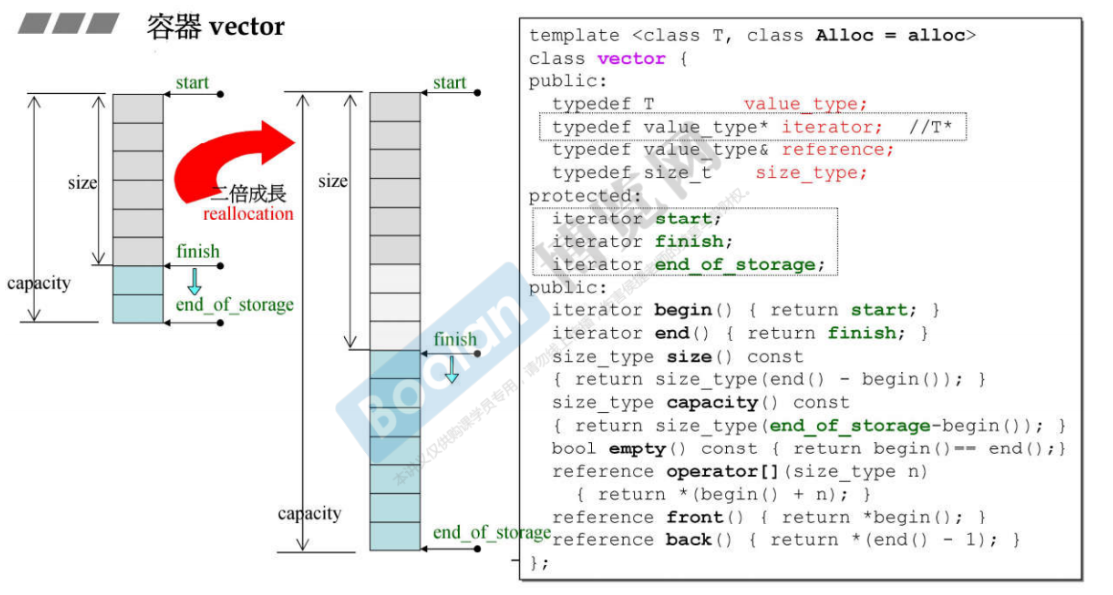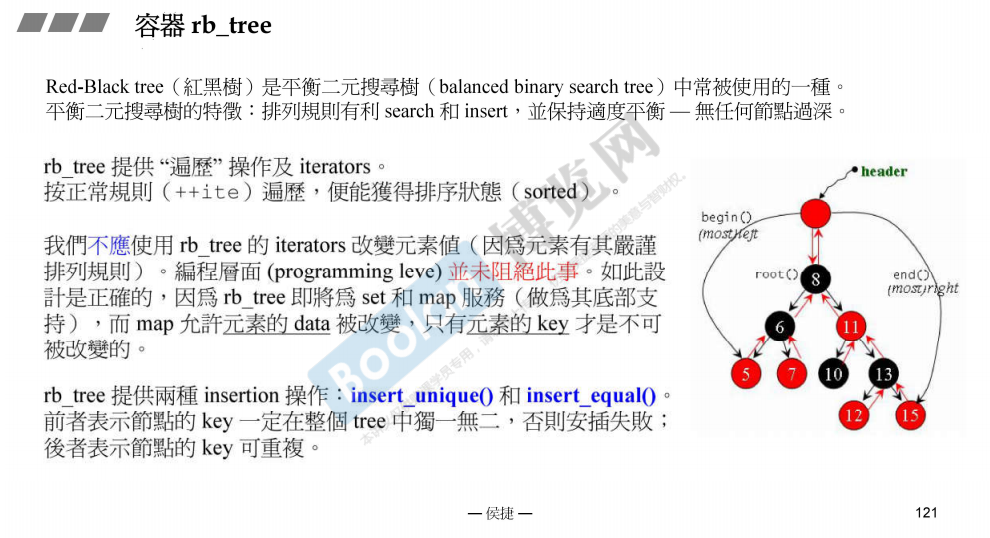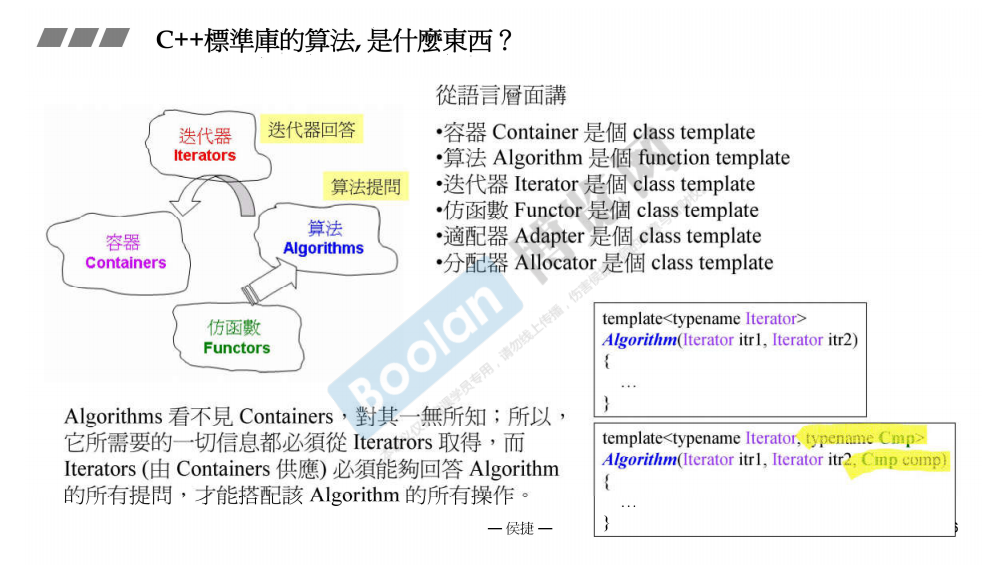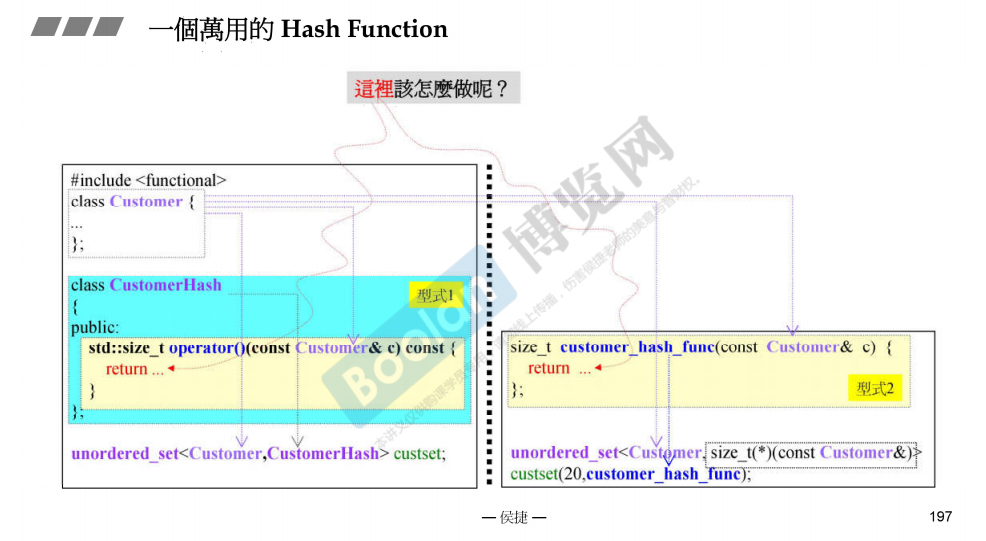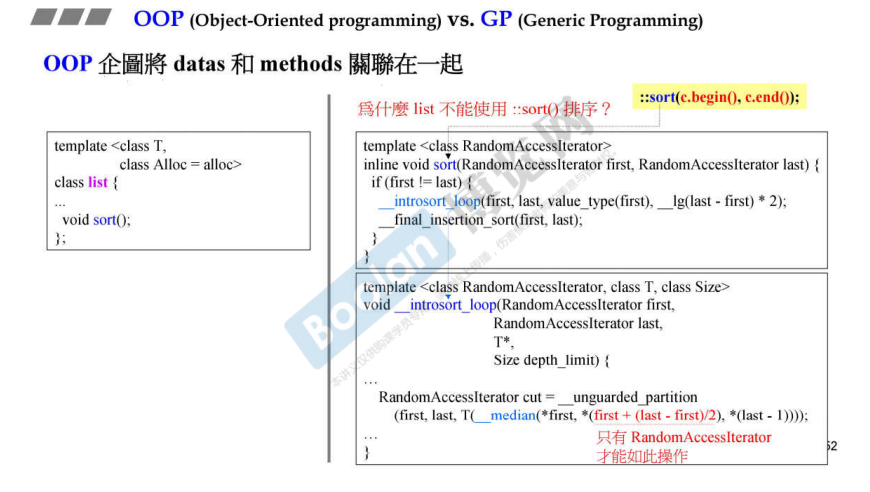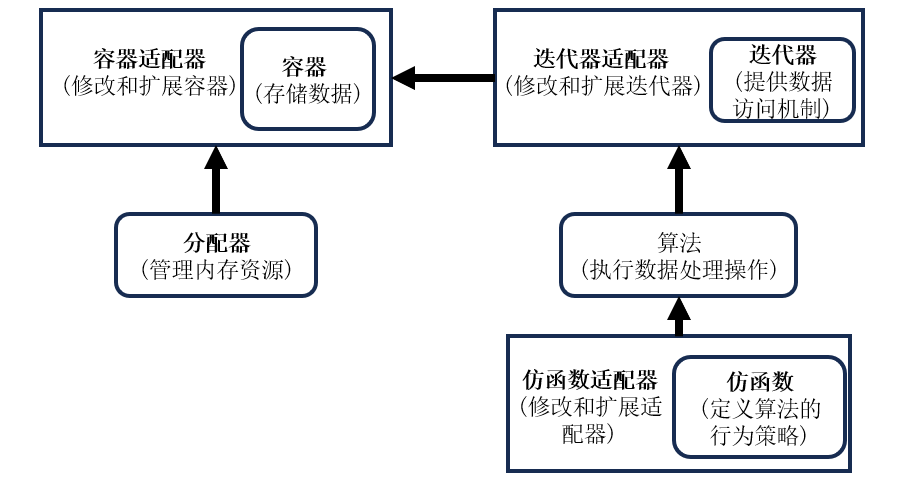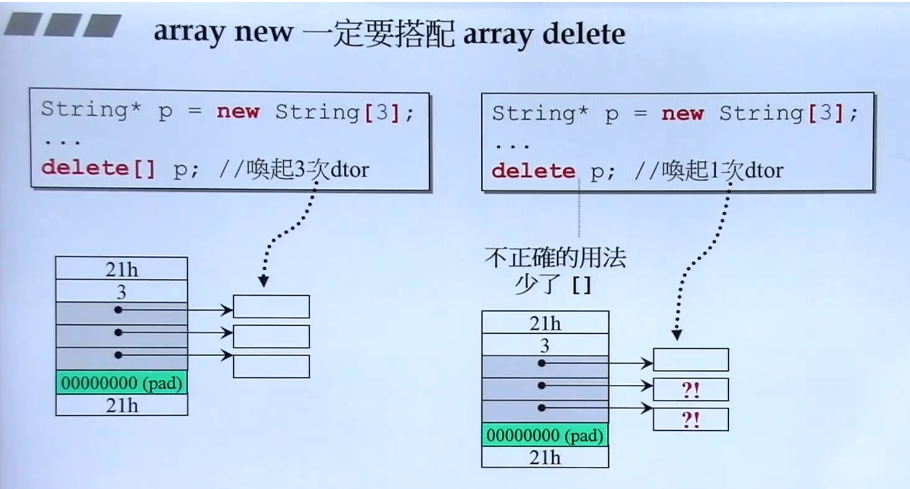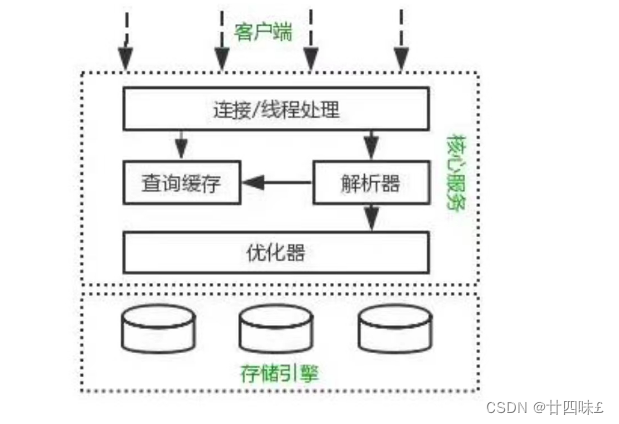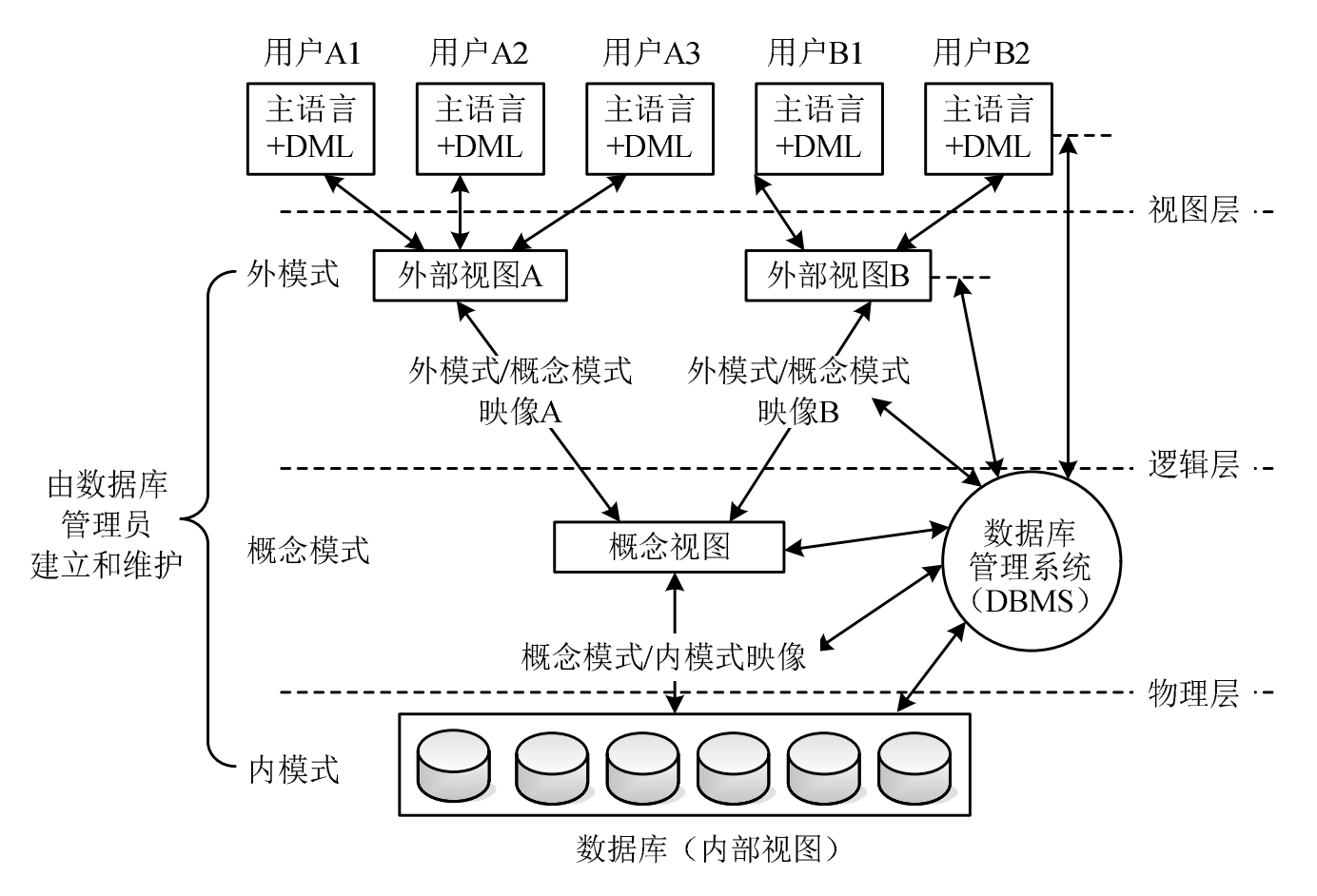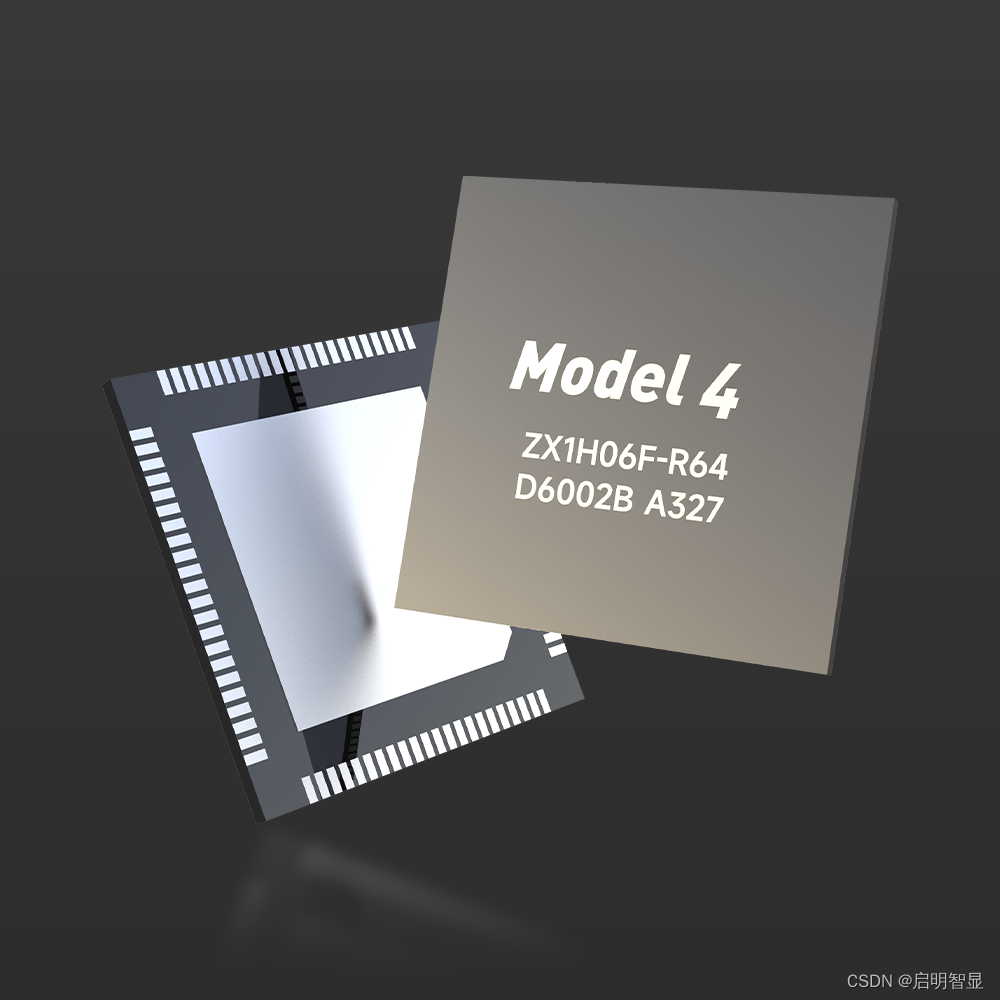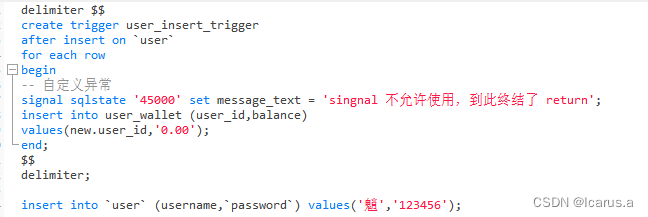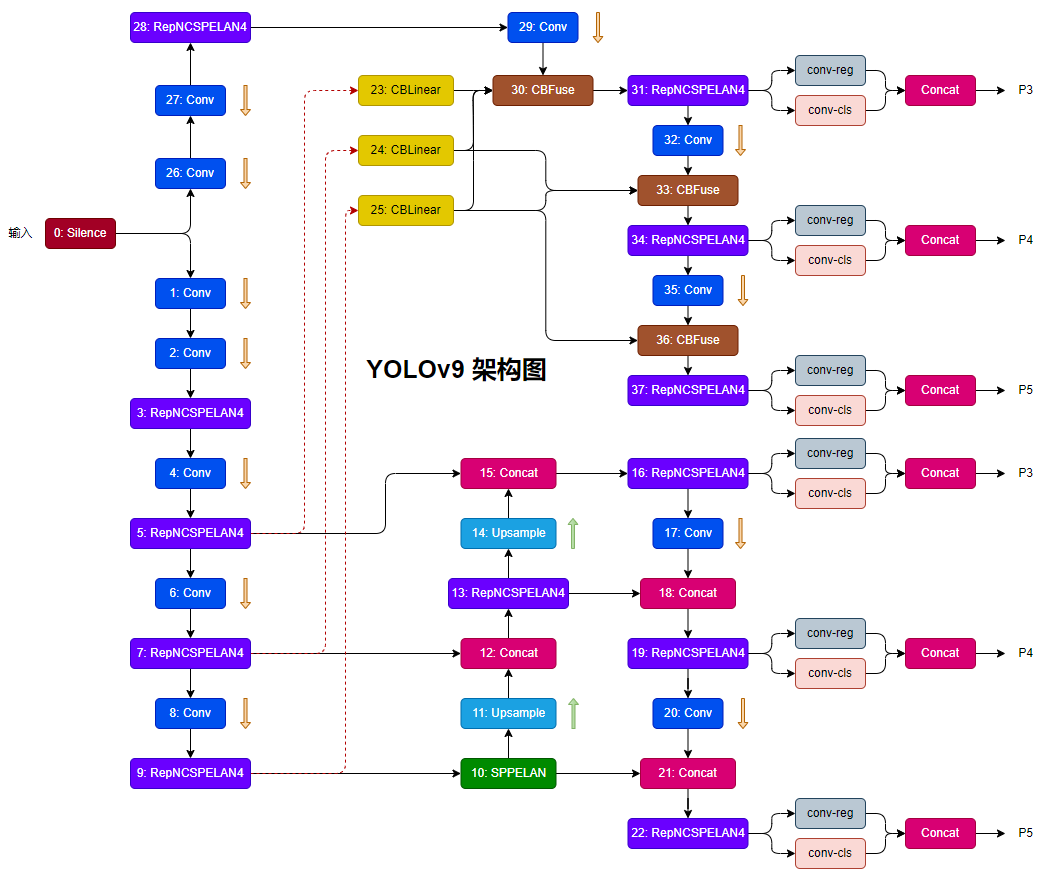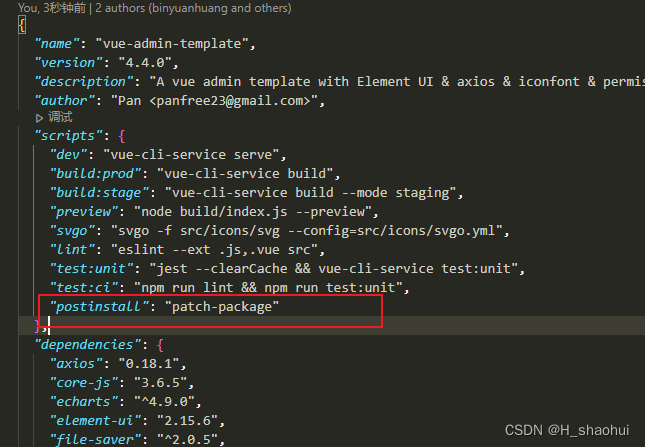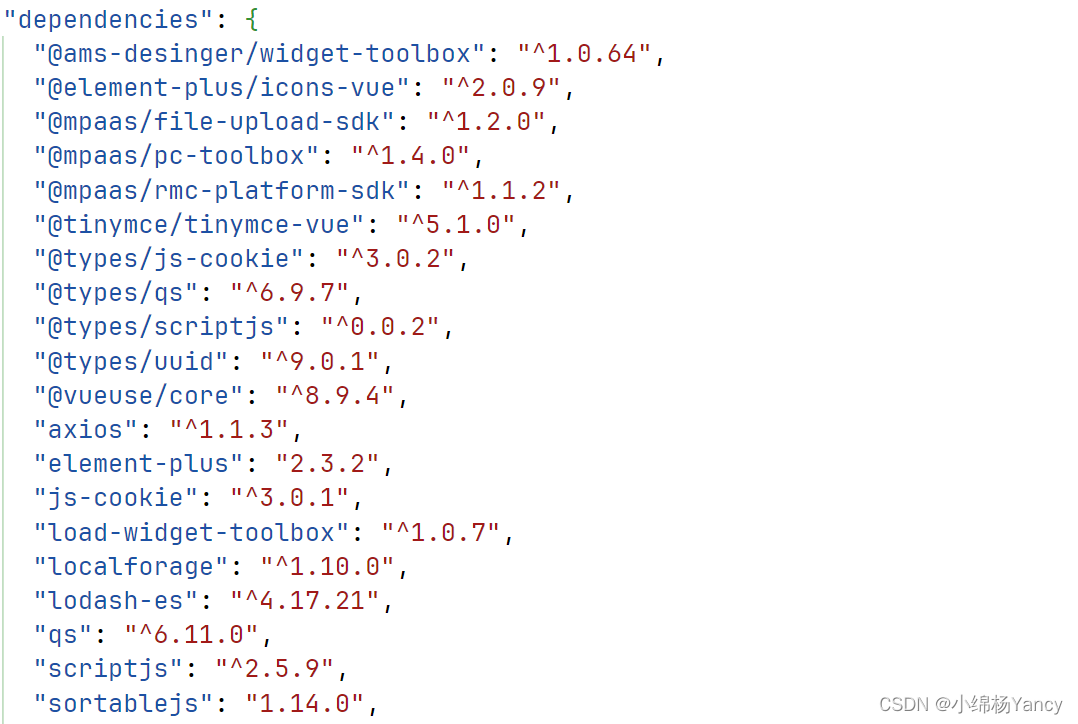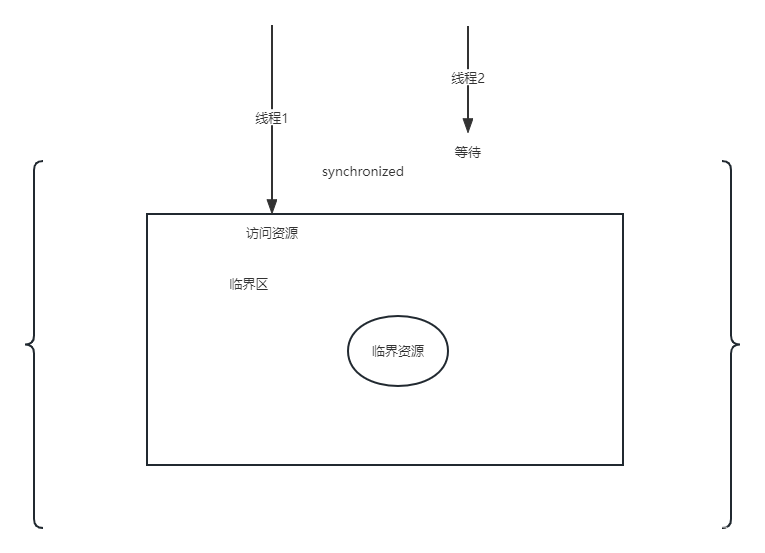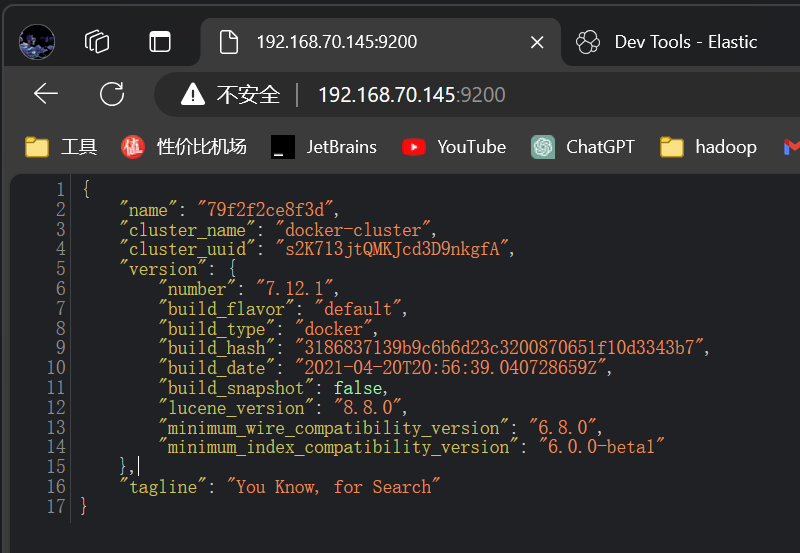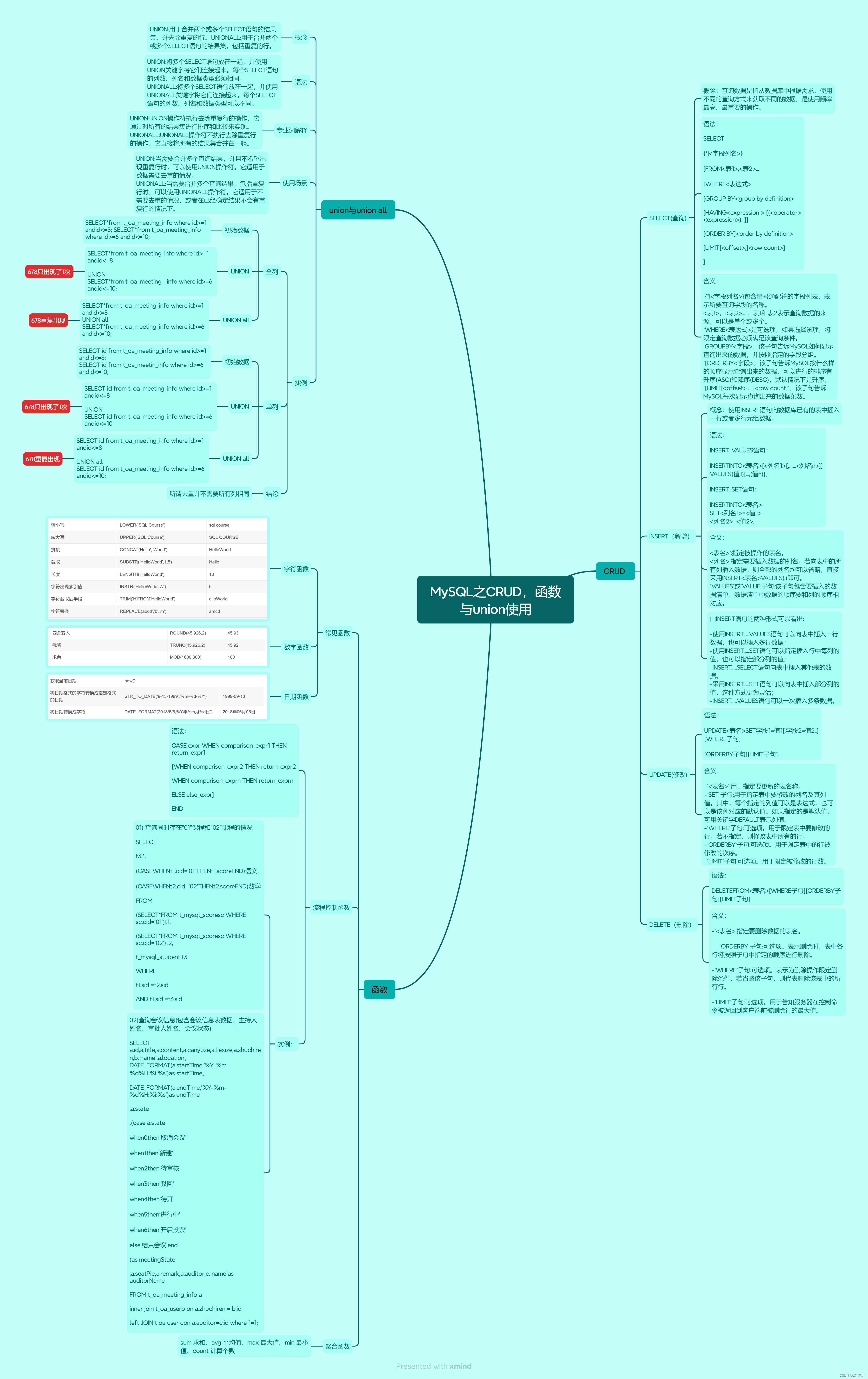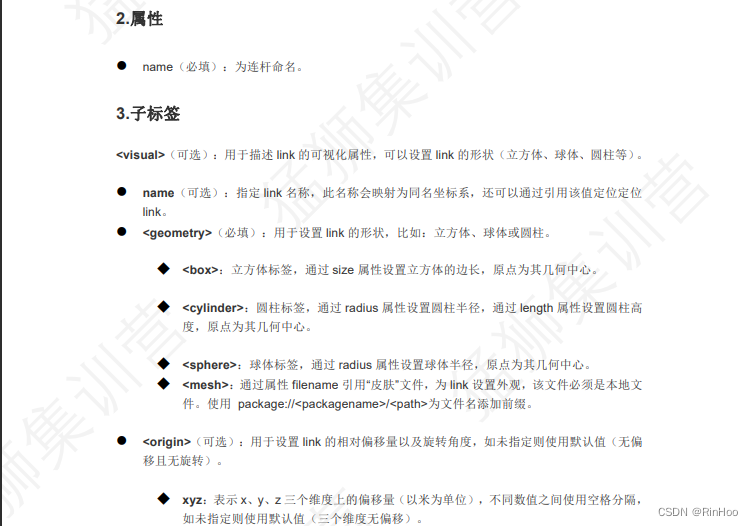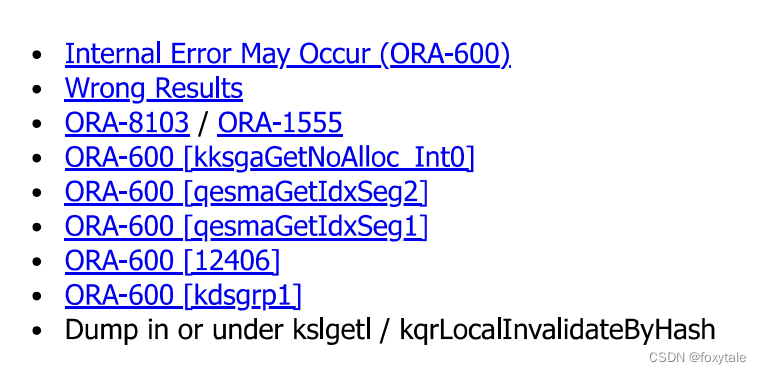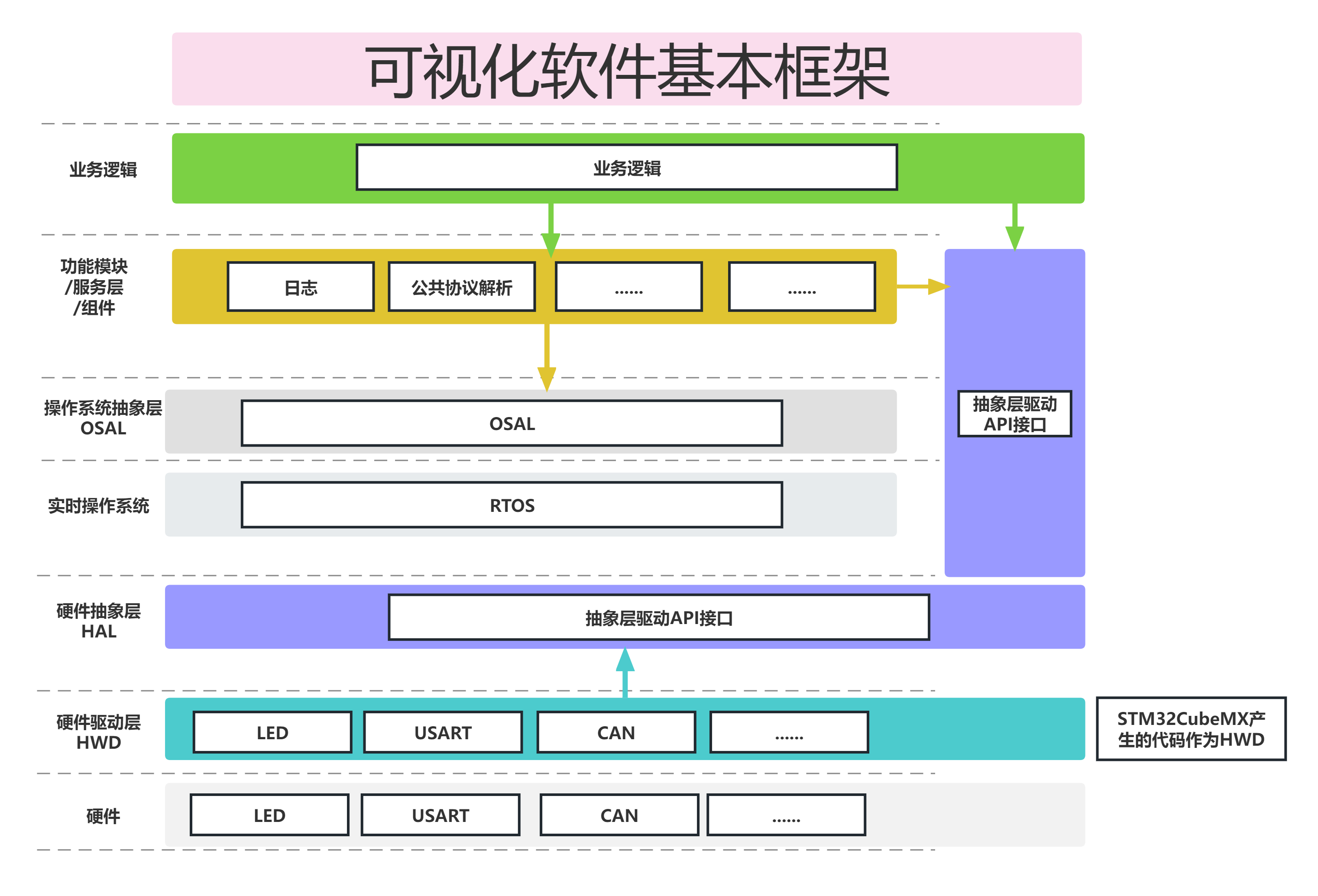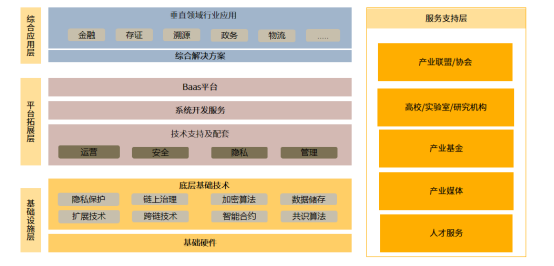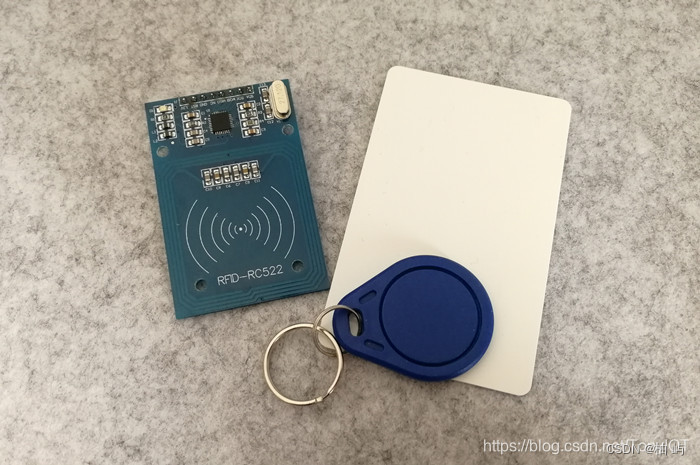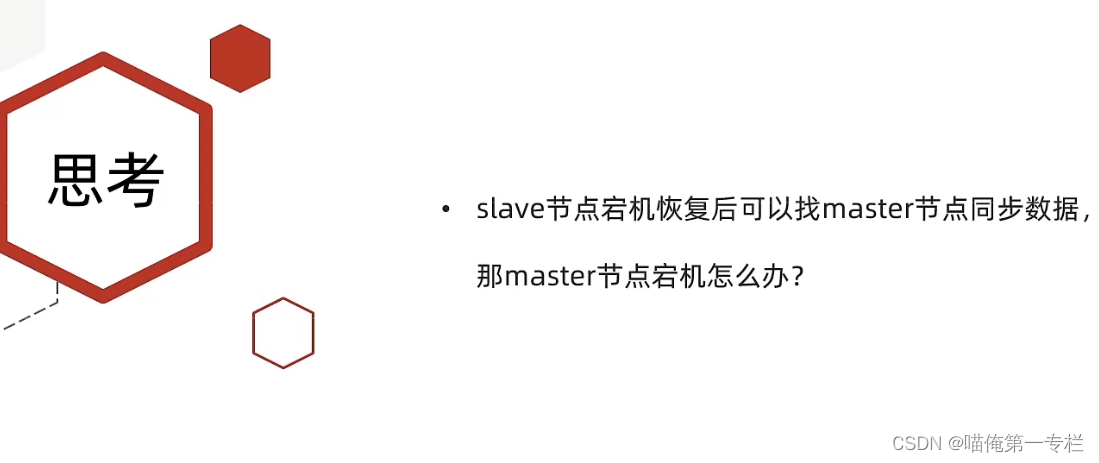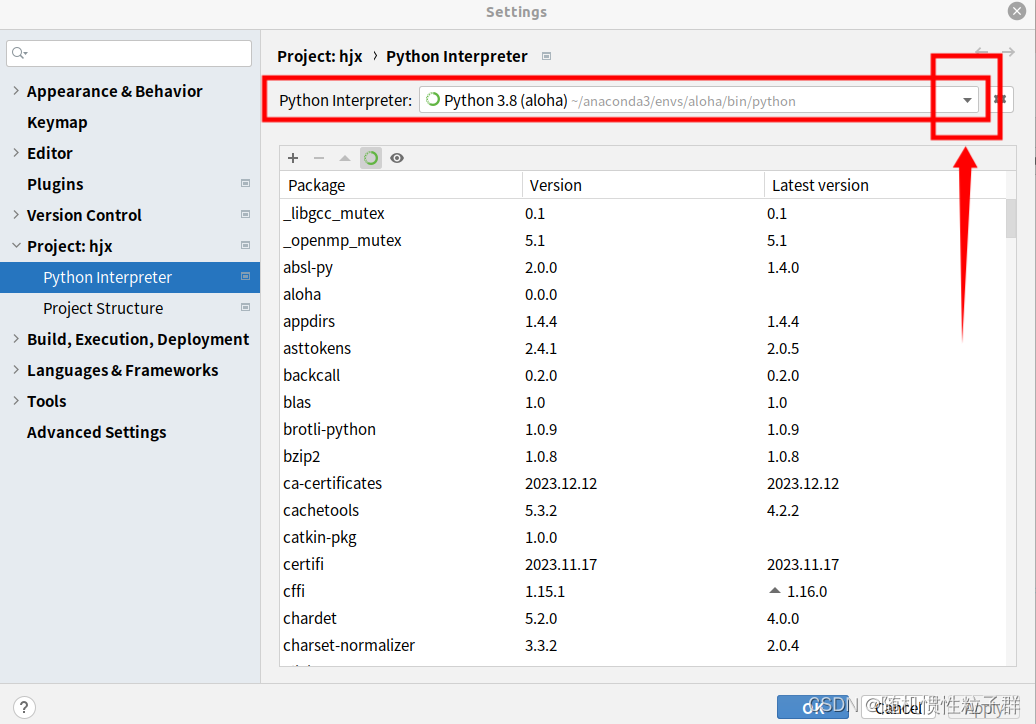STL标准库与泛型编程(侯捷)
本文是学习笔记,仅供个人学习使用。如有侵权,请联系删除。
参考链接
Github:STL源码剖析中源码 https://github.com/SilverMaple/STLSourceCodeNote/tree/master
Github:课程ppt和源码 https://github.com/ZachL1/Bilibili-plus
文章目录
本节主要介绍STL容器的使用方法
STL有很多容器,大概分类如下:
■ 标准STL序列容器
:vector、string、deque和list。
■ 标准STL关联容器
:set、multiset、map和multimap。
■ 非标准序列容器
slist和rope。slist是一个单向链表,rope本质上是一个“重型”string。
■ 非标准的关联容器
hash_set、hash_multiset、hash_map和hash_multimap。所有hash开头的,在c++11里面改名为unordered,比如unordered_set。
3 容器之分类与各种测试(一):array
测试开50万大小的array,排序并且查找花费的时间。大概0.18秒。
const long ASIZE = 500000L;
long get_a_target_long()
{
long target=0;
cout << "target (0~" << RAND_MAX << "): ";
cin >> target;
return target;
}
int compareLongs(const void* a, const void* b)
{
return ( *(long*)a - *(long*)b );
}
#include <array>
#include <iostream>
#include <ctime>
#include <cstdlib> //qsort, bsearch, NULL
namespace jj01
{
void test_array()
{
cout << "\ntest_array().......... \n";
array<long,ASIZE> c;
clock_t timeStart = clock();
for(long i=0; i< ASIZE; ++i) {
c[i] = rand();
}
cout << "milli-seconds : " << (clock()-timeStart) << endl; //
cout << "array.size()= " << c.size() << endl;
cout << "array.front()= " << c.front() << endl;
cout << "array.back()= " << c.back() << endl;
cout << "array.data()= " << c.data() << endl; // 得到array起始地址
long target = get_a_target_long();
timeStart = clock();
::qsort(c.data(), ASIZE, sizeof(long), compareLongs); // 前面加双冒号::表示全局函数
long* pItem = (long*)::bsearch(&target, (c.data()), ASIZE, sizeof(long), compareLongs);
cout << "qsort()+bsearch(), milli-seconds : " << (clock()-timeStart) << endl; //
if (pItem != NULL)
cout << "found, " << *pItem << endl;
else
cout << "not found! " << endl;
}
}
4 容器之分类与各种测试(二):vector
测试vector:放入100万个元素到vector中,放入的时间大概是3秒。
vector当放入新元素的时候,如果空间不够,它会变成原来大小的两倍,即两倍增长。
#include <vector>
#include <stdexcept>
#include <string>
#include <cstdlib> //abort()
#include <cstdio> //snprintf()
#include <iostream>
#include <ctime>
#include <algorithm> //sort()
namespace jj02
{
void test_vector(long& value)
{
cout << "\ntest_vector().......... \n";
vector<string> c;
char buf[10];
clock_t timeStart = clock();
for(long i=0; i< value; ++i)
{
try {
snprintf(buf, 10, "%d", rand());
c.push_back(string(buf));
}
catch(exception& p) {
cout << "i=" << i << " " << p.what() << endl;
//曾經最高 i=58389486 then std::bad_alloc
abort();
}
}
cout << "milli-seconds : " << (clock()-timeStart) << endl;
cout << "vector.max_size()= " << c.max_size() << endl; //1073747823
cout << "vector.size()= " << c.size() << endl; // 真正元素的个数
cout << "vector.front()= " << c.front() << endl;
cout << "vector.back()= " << c.back() << endl;
cout << "vector.data()= " << c.data() << endl;
cout << "vector.capacity()= " << c.capacity() << endl << endl; //目前vector实际分配的空间有多大
string target = get_a_target_string();
{
timeStart = clock();
auto pItem = find(c.begin(), c.end(), target);
cout << "std::find(), milli-seconds : " << (clock()-timeStart) << endl;
if (pItem != c.end())
cout << "found, " << *pItem << endl << endl;
else
cout << "not found! " << endl << endl;
}
{
timeStart = clock();
sort(c.begin(), c.end());
cout << "sort(), milli-seconds : " << (clock()-timeStart) << endl;
timeStart = clock();
string* pItem = (string*)::bsearch(&target, (c.data()),
c.size(), sizeof(string), compareStrings);
cout << "bsearch(), milli-seconds : " << (clock()-timeStart) << endl;
if (pItem != NULL)
cout << "found, " << *pItem << endl << endl;
else
cout << "not found! " << endl << endl;
}
c.clear();
test_moveable(vector<MyString>(),vector<MyStrNoMove>(), value);
}
}
5 容器之分类与各种测试(三)list, deque,stack, queue
使用容器list
list是双向链表,放入元素也是push_back
#include <list>
#include <stdexcept>
#include <string>
#include <cstdlib> //abort()
#include <cstdio> //snprintf()
#include <algorithm> //find()
#include <iostream>
#include <ctime>
namespace jj03
{
void test_list(long& value)
{
cout << "\ntest_list().......... \n";
list<string> c;
char buf[10];
clock_t timeStart = clock();
for(long i=0; i< value; ++i)
{
try {
snprintf(buf, 10, "%d", rand());
c.push_back(string(buf));
}
catch(exception& p) {
cout << "i=" << i << " " << p.what() << endl;
abort();
}
}
cout << "milli-seconds : " << (clock()-timeStart) << endl;
cout << "list.size()= " << c.size() << endl;
cout << "list.max_size()= " << c.max_size() << endl; //357913941
cout << "list.front()= " << c.front() << endl;
cout << "list.back()= " << c.back() << endl;
string target = get_a_target_string();
timeStart = clock();
auto pItem = find(c.begin(), c.end(), target);
cout << "std::find(), milli-seconds : " << (clock()-timeStart) << endl;
if (pItem != c.end())
cout << "found, " << *pItem << endl;
else
cout << "not found! " << endl;
timeStart = clock();
c.sort();
cout << "c.sort(), milli-seconds : " << (clock()-timeStart) << endl;
c.clear();
test_moveable(list<MyString>(),list<MyStrNoMove>(), value);
}
}
使用容器forward_list
单向链表,它没有push_back,只有push_front函数
#include <forward_list>
#include <stdexcept>
#include <string>
#include <cstdlib> //abort()
#include <cstdio> //snprintf()
#include <iostream>
#include <ctime>
namespace jj04
{
void test_forward_list(long& value)
{
cout << "\ntest_forward_list().......... \n";
forward_list<string> c;
char buf[10];
clock_t timeStart = clock();
for(long i=0; i< value; ++i)
{
try {
snprintf(buf, 10, "%d", rand());
c.push_front(string(buf));
}
catch(exception& p) {
cout << "i=" << i << " " << p.what() << endl;
abort();
}
}
cout << "milli-seconds : " << (clock()-timeStart) << endl;
cout << "forward_list.max_size()= " << c.max_size() << endl; //536870911
cout << "forward_list.front()= " << c.front() << endl;
string target = get_a_target_string();
timeStart = clock();
auto pItem = find(c.begin(), c.end(), target);
cout << "std::find(), milli-seconds : " << (clock()-timeStart) << endl;
if (pItem != c.end())
cout << "found, " << *pItem << endl;
else
cout << "not found! " << endl;
timeStart = clock();
c.sort();
cout << "c.sort(), milli-seconds : " << (clock()-timeStart) << endl;
c.clear();
}
}
使用容器slist
测试容器slist:slist也是单向链表
#include <ext\slist>
#include <stdexcept>
#include <string>
#include <cstdlib> //abort()
#include <cstdio> //snprintf()
#include <iostream>
#include <ctime>
namespace jj10
{
void test_slist(long& value)
{
cout << "\ntest_slist().......... \n";
__gnu_cxx::slist<string> c;
char buf[10];
clock_t timeStart = clock();
for(long i=0; i< value; ++i)
{
try {
snprintf(buf, 10, "%d", rand());
c.push_front(string(buf));
}
catch(exception& p) {
cout << "i=" << i << " " << p.what() << endl;
abort();
}
}
cout << "milli-seconds : " << (clock()-timeStart) << endl;
}
}
使用容器deque
双端队列
deque底层是分段连续,但是对使用者来说是连续的。
#include <deque>
#include <stdexcept>
#include <string>
#include <cstdlib> //abort()
#include <cstdio> //snprintf()
#include <iostream>
#include <ctime>
namespace jj05
{
void test_deque(long& value)
{
cout << "\ntest_deque().......... \n";
deque<string> c;
char buf[10];
clock_t timeStart = clock();
for(long i=0; i< value; ++i)
{
try {
snprintf(buf, 10, "%d", rand());
c.push_back(string(buf));
}
catch(exception& p) {
cout << "i=" << i << " " << p.what() << endl;
abort();
}
}
cout << "milli-seconds : " << (clock()-timeStart) << endl;
cout << "deque.size()= " << c.size() << endl;
cout << "deque.front()= " << c.front() << endl;
cout << "deque.back()= " << c.back() << endl;
cout << "deque.max_size()= " << c.max_size() << endl; //1073741821
string target = get_a_target_string();
timeStart = clock();
auto pItem = find(c.begin(), c.end(), target);
cout << "std::find(), milli-seconds : " << (clock()-timeStart) << endl;
if (pItem != c.end())
cout << "found, " << *pItem << endl;
else
cout << "not found! " << endl;
timeStart = clock();
sort(c.begin(), c.end());
cout << "sort(), milli-seconds : " << (clock()-timeStart) << endl;
c.clear();
test_moveable(deque<MyString>(),deque<MyStrNoMove>(), value);
}
}
使用容器stack
stack本身使用deque实现, stack是先进后出
#include <stack>
#include <stdexcept>
#include <string>
#include <cstdlib> //abort()
#include <cstdio> //snprintf()
#include <iostream>
#include <ctime>
namespace jj17
{
void test_stack(long& value)
{
cout << "\ntest_stack().......... \n";
stack<string> c;
char buf[10];
clock_t timeStart = clock();
for(long i=0; i< value; ++i)
{
try {
snprintf(buf, 10, "%d", rand());
c.push(string(buf));
}
catch(exception& p) {
cout << "i=" << i << " " << p.what() << endl;
abort();
}
}
cout << "milli-seconds : " << (clock()-timeStart) << endl;
cout << "stack.size()= " << c.size() << endl;
cout << "stack.top()= " << c.top() << endl;
c.pop();
cout << "stack.size()= " << c.size() << endl;
cout << "stack.top()= " << c.top() << endl;
{
stack<string, list<string>> c; //以 list 為底層
for(long i=0; i< 10; ++i) {
snprintf(buf, 10, "%d", rand());
c.push(string(buf));
}
cout << "stack.size()= " << c.size() << endl;
cout << "stack.top()= " << c.top() << endl;
c.pop();
cout << "stack.size()= " << c.size() << endl;
cout << "stack.top()= " << c.top() << endl;
}
{
stack<string, vector<string>> c; //以 vector 為底層
for(long i=0; i< 10; ++i) {
snprintf(buf, 10, "%d", rand());
c.push(string(buf));
}
cout << "stack.size()= " << c.size() << endl;
cout << "stack.top()= " << c.top() << endl;
c.pop();
cout << "stack.size()= " << c.size() << endl;
cout << "stack.top()= " << c.top() << endl;
}
{
stack<string, set<string>> c; //以 set 為底層
/*!
for(long i=0; i< 10; ++i) {
snprintf(buf, 10, "%d", rand());
c.push(string(buf));
}
cout << "stack.size()= " << c.size() << endl;
cout << "stack.top()= " << c.top() << endl;
c.pop();
cout << "stack.size()= " << c.size() << endl;
cout << "stack.top()= " << c.top() << endl;
//[Error] 'class std::set<std::basic_string<char> >' has no member named 'push_back'
//[Error] 'class std::set<std::basic_string<char> >' has no member named 'back'
//[Error] 'class std::set<std::basic_string<char> >' has no member named 'pop_back'
*/
}
//!stack<string, map(string>> c5; 以 map 為底層, [Error] template argument 2 is invalid
//!stack<string>::iterator ite1; //[Error] 'iterator' is not a member of 'std::stack<std::basic_string<char> >'
}
}
使用容器queue
queue(队列)本身使用deque实现,queue先进先出
#include <queue>
#include <stdexcept>
#include <string>
#include <cstdlib> //abort()
#include <cstdio> //snprintf()
#include <iostream>
#include <ctime>
namespace jj18
{
void test_queue(long& value)
{
cout << "\ntest_queue().......... \n";
queue<string> c;
char buf[10];
clock_t timeStart = clock();
for(long i=0; i< value; ++i)
{
try {
snprintf(buf, 10, "%d", rand());
c.push(string(buf));
}
catch(exception& p) {
cout << "i=" << i << " " << p.what() << endl;
abort();
}
}
cout << "milli-seconds : " << (clock()-timeStart) << endl;
cout << "queue.size()= " << c.size() << endl;
cout << "queue.front()= " << c.front() << endl;
cout << "queue.back()= " << c.back() << endl;
c.pop();
cout << "queue.size()= " << c.size() << endl;
cout << "queue.front()= " << c.front() << endl;
cout << "queue.back()= " << c.back() << endl;
{
queue<string, list<string>> c; //以 list 為底層
for(long i=0; i< 10; ++i) {
snprintf(buf, 10, "%d", rand());
c.push(string(buf));
}
cout << "queue.size()= " << c.size() << endl;
cout << "queue.front()= " << c.front() << endl;
cout << "queue.back()= " << c.back() << endl;
c.pop();
cout << "queue.size()= " << c.size() << endl;
cout << "queue.front()= " << c.front() << endl;
cout << "queue.back()= " << c.back() << endl;
}
{
queue<string, vector<string>> c; //以 vector 為底層
for(long i=0; i< 10; ++i) {
snprintf(buf, 10, "%d", rand());
c.push(string(buf));
}
cout << "queue.size()= " << c.size() << endl;
cout << "queue.front()= " << c.front() << endl;
cout << "queue.back()= " << c.back() << endl;
//!c.pop(); //[Error] 'class std::vector<std::basic_string<char> >' has no member named 'pop_front'
cout << "queue.size()= " << c.size() << endl;
cout << "queue.front()= " << c.front() << endl;
cout << "queue.back()= " << c.back() << endl;
}
{
queue<string, set<string>> c; //以 set 為底層
/*!
for(long i=0; i< 10; ++i) {
snprintf(buf, 10, "%d", rand());
c.push(string(buf));
}
cout << "queue.size()= " << c.size() << endl;
cout << "queue.front()= " << c.front() << endl;
cout << "queue.back()= " << c.back() << endl;
c.pop();
cout << "queue.size()= " << c.size() << endl;
cout << "queue.front()= " << c.front() << endl;
cout << "queue.back()= " << c.back() << endl;
//[Error] 'class std::set<std::basic_string<char> >' has no member named 'push_back'
//[Error] 'class std::set<std::basic_string<char> >' has no member named 'front'
//[Error] 'class std::set<std::basic_string<char> >' has no member named 'pop_front'
*/
}
//! queue<string, map<string>> c5; //以 map 為底層, [Error] template argument 2 is invalid
//! queue<string>::iterator ite1; //[Error] 'iterator' is not a member of 'std::queue<std::basic_string<char> >'
}
}
6 容器之分类与各种测试(四):set和unordered_set等
使用容器multiset
Set和multiset会根据特定的排序准则,自动将元素排序。两者不同之处在于multiset允许元素重复而set不允许。
#include <set>
#include <stdexcept>
#include <string>
#include <cstdlib> //abort()
#include <cstdio> //snprintf()
#include <iostream>
#include <ctime>
namespace jj06
{
void test_multiset(long& value)
{
cout << "\ntest_multiset().......... \n";
multiset<string> c;
char buf[10];
clock_t timeStart = clock();
for(long i=0; i< value; ++i)
{
try {
snprintf(buf, 10, "%d", rand());
c.insert(string(buf));
}
catch(exception& p) {
cout << "i=" << i << " " << p.what() << endl;
abort();
}
}
cout << "milli-seconds : " << (clock()-timeStart) << endl;
cout << "multiset.size()= " << c.size() << endl;
cout << "multiset.max_size()= " << c.max_size() << endl; //214748364
string target = get_a_target_string();
{
timeStart = clock();
auto pItem = find(c.begin(), c.end(), target); //比 c.find(...) 慢很多
cout << "std::find(), milli-seconds : " << (clock()-timeStart) << endl;
if (pItem != c.end())
cout << "found, " << *pItem << endl;
else
cout << "not found! " << endl;
}
{
timeStart = clock();
auto pItem = c.find(target); //比 std::find(...) 快很多
cout << "c.find(), milli-seconds : " << (clock()-timeStart) << endl;
if (pItem != c.end())
cout << "found, " << *pItem << endl;
else
cout << "not found! " << endl;
}
c.clear();
test_moveable(multiset<MyString>(),multiset<MyStrNoMove>(), value);
}
}
使用容器multimap
Map和multimap将key/value pair当作元素进行管理。它们可根据key的排序准则自动为元素排序。Multimap允许重复元素,map不允许
#include <map>
#include <stdexcept>
#include <string>
#include <cstdlib> //abort()
#include <cstdio> //snprintf()
#include <iostream>
#include <ctime>
namespace jj07
{
void test_multimap(long& value)
{
cout << "\ntest_multimap().......... \n";
multimap<long, string> c;
char buf[10];
clock_t timeStart = clock();
for(long i=0; i< value; ++i)
{
try {
snprintf(buf, 10, "%d", rand());
//multimap 不可使用 [] 做 insertion
c.insert(pair<long,string>(i,buf));
}
catch(exception& p) {
cout << "i=" << i << " " << p.what() << endl;
abort();
}
}
cout << "milli-seconds : " << (clock()-timeStart) << endl;
cout << "multimap.size()= " << c.size() << endl;
cout << "multimap.max_size()= " << c.max_size() << endl; //178956970
long target = get_a_target_long();
timeStart = clock();
auto pItem = c.find(target);
cout << "c.find(), milli-seconds : " << (clock()-timeStart) << endl;
if (pItem != c.end())
cout << "found, value=" << (*pItem).second << endl;
else
cout << "not found! " << endl;
c.clear();
}
}
使用容器unordered_multiset
不是基于红黑树,而是基于hash table。允许重复的key存在
#include <unordered_set>
#include <stdexcept>
#include <string>
#include <cstdlib> //abort()
#include <cstdio> //snprintf()
#include <iostream>
#include <ctime>
namespace jj08
{
void test_unordered_multiset(long& value)
{
cout << "\ntest_unordered_multiset().......... \n";
unordered_multiset<string> c;
char buf[10];
clock_t timeStart = clock();
for(long i=0; i< value; ++i)
{
try {
snprintf(buf, 10, "%d", rand());
c.insert(string(buf));
}
catch(exception& p) {
cout << "i=" << i << " " << p.what() << endl;
abort();
}
}
cout << "milli-seconds : " << (clock()-timeStart) << endl;
cout << "unordered_multiset.size()= " << c.size() << endl;
cout << "unordered_multiset.max_size()= " << c.max_size() << endl; //357913941
cout << "unordered_multiset.bucket_count()= " << c.bucket_count() << endl; // 桶的数量
cout << "unordered_multiset.load_factor()= " << c.load_factor() << endl;
cout << "unordered_multiset.max_load_factor()= " << c.max_load_factor() << endl;
cout << "unordered_multiset.max_bucket_count()= " << c.max_bucket_count() << endl;
for (unsigned i=0; i< 20; ++i) {
cout << "bucket #" << i << " has " << c.bucket_size(i) << " elements.\n";
}
string target = get_a_target_string();
{
timeStart = clock();
auto pItem = find(c.begin(), c.end(), target); //比 c.find(...) 慢很多
cout << "std::find(), milli-seconds : " << (clock()-timeStart) << endl;
if (pItem != c.end())
cout << "found, " << *pItem << endl;
else
cout << "not found! " << endl;
}
{
timeStart = clock();
auto pItem = c.find(target); //比 std::find(...) 快很多
cout << "c.find(), milli-seconds : " << (clock()-timeStart) << endl;
if (pItem != c.end())
cout << "found, " << *pItem << endl;
else
cout << "not found! " << endl;
}
c.clear();
test_moveable(unordered_multiset<MyString>(),unordered_multiset<MyStrNoMove>(), value);
}
使用容器unordered_multimap
允许重复的key存在
#include <unordered_map>
#include <stdexcept>
#include <string>
#include <cstdlib> //abort()
#include <cstdio> //snprintf()
#include <iostream>
#include <ctime>
namespace jj09
{
void test_unordered_multimap(long& value)
{
cout << "\ntest_unordered_multimap().......... \n";
unordered_multimap<long, string> c;
char buf[10];
clock_t timeStart = clock();
for(long i=0; i< value; ++i)
{
try {
snprintf(buf, 10, "%d", rand());
//multimap 不可使用 [] 進行 insertion
c.insert(pair<long,string>(i,buf));
}
catch(exception& p) {
cout << "i=" << i << " " << p.what() << endl;
abort();
}
}
cout << "milli-seconds : " << (clock()-timeStart) << endl;
cout << "unordered_multimap.size()= " << c.size() << endl;
cout << "unordered_multimap.max_size()= " << c.max_size() << endl; //357913941
long target = get_a_target_long();
timeStart = clock();
auto pItem = c.find(target);
cout << "c.find(), milli-seconds : " << (clock()-timeStart) << endl;
if (pItem != c.end())
cout << "found, value=" << (*pItem).second << endl;
else
cout << "not found! " << endl;
}
}
使用容器set
set中key不可重复
#include <set>
#include <stdexcept>
#include <string>
#include <cstdlib> //abort()
#include <cstdio> //snprintf()
#include <iostream>
#include <ctime>
namespace jj13
{
void test_set(long& value)
{
cout << "\ntest_set().......... \n";
set<string> c;
char buf[10];
clock_t timeStart = clock();
for(long i=0; i< value; ++i)
{
try {
snprintf(buf, 10, "%d", rand());
c.insert(string(buf));
}
catch(exception& p) {
cout << "i=" << i << " " << p.what() << endl;
abort();
}
}
cout << "milli-seconds : " << (clock()-timeStart) << endl;
cout << "set.size()= " << c.size() << endl;
cout << "set.max_size()= " << c.max_size() << endl; //214748364
string target = get_a_target_string();
{
timeStart = clock();
auto pItem = find(c.begin(), c.end(), target); //比 c.find(...) 慢很多
cout << "std::find(), milli-seconds : " << (clock()-timeStart) << endl;
if (pItem != c.end())
cout << "found, " << *pItem << endl;
else
cout << "not found! " << endl;
}
{
timeStart = clock();
auto pItem = c.find(target); //比 std::find(...) 快很多
cout << "c.find(), milli-seconds : " << (clock()-timeStart) << endl;
if (pItem != c.end())
cout << "found, " << *pItem << endl;
else
cout << "not found! " << endl;
}
}
}
使用容器map
底部是红黑树,存的元素是不能重复的
#include <map>
#include <stdexcept>
#include <string>
#include <cstdlib> //abort()
#include <cstdio> //snprintf()
#include <iostream>
#include <ctime>
namespace jj14
{
void test_map(long& value)
{
cout << "\ntest_map().......... \n";
map<long, string> c;
char buf[10];
clock_t timeStart = clock();
for(long i=0; i< value; ++i)
{
try {
snprintf(buf, 10, "%d", rand());
c[i] = string(buf);
}
catch(exception& p) {
cout << "i=" << i << " " << p.what() << endl;
abort();
}
}
cout << "milli-seconds : " << (clock()-timeStart) << endl;
cout << "map.size()= " << c.size() << endl;
cout << "map.max_size()= " << c.max_size() << endl; //178956970
long target = get_a_target_long();
timeStart = clock();
auto pItem = c.find(target);
cout << "c.find(), milli-seconds : " << (clock()-timeStart) << endl;
if (pItem != c.end())
cout << "found, value=" << (*pItem).second << endl;
else
cout << "not found! " << endl;
c.clear();
}
}
使用容器 unordered_set
底层实现是hash table.
#include <unordered_set>
#include <stdexcept>
#include <string>
#include <cstdlib> //abort()
#include <cstdio> //snprintf()
#include <iostream>
#include <ctime>
namespace jj15
{
void test_unordered_set(long& value)
{
cout << "\ntest_unordered_set().......... \n";
unordered_set<string> c;
char buf[10];
clock_t timeStart = clock();
for(long i=0; i< value; ++i)
{
try {
snprintf(buf, 10, "%d", rand());
c.insert(string(buf));
}
catch(exception& p) {
cout << "i=" << i << " " << p.what() << endl;
abort();
}
}
cout << "milli-seconds : " << (clock()-timeStart) << endl;
cout << "unordered_set.size()= " << c.size() << endl;
cout << "unordered_set.max_size()= " << c.max_size() << endl; //357913941
cout << "unordered_set.bucket_count()= " << c.bucket_count() << endl;
cout << "unordered_set.load_factor()= " << c.load_factor() << endl;
cout << "unordered_set.max_load_factor()= " << c.max_load_factor() << endl;
cout << "unordered_set.max_bucket_count()= " << c.max_bucket_count() << endl;
for (unsigned i=0; i< 20; ++i) {
cout << "bucket #" << i << " has " << c.bucket_size(i) << " elements.\n";
}
string target = get_a_target_string();
{
timeStart = clock();
auto pItem = find(c.begin(), c.end(), target); //比 c.find(...) 慢很多
cout << "std::find(), milli-seconds : " << (clock()-timeStart) << endl;
if (pItem != c.end())
cout << "found, " << *pItem << endl;
else
cout << "not found! " << endl;
}
{
timeStart = clock();
auto pItem = c.find(target); //比 std::find(...) 快很多
cout << "c.find(), milli-seconds : " << (clock()-timeStart) << endl;
if (pItem != c.end())
cout << "found, " << *pItem << endl;
else
cout << "not found! " << endl;
}
}
}
使用容器unordered_map
底层实现是hash table。
#include <unordered_map>
#include <stdexcept>
#include <string>
#include <cstdlib> //abort()
#include <cstdio> //snprintf()
#include <iostream>
#include <ctime>
namespace jj16
{
void test_unordered_map(long& value)
{
cout << "\ntest_unordered_map().......... \n";
unordered_map<long, string> c;
char buf[10];
clock_t timeStart = clock();
for(long i=0; i< value; ++i)
{
try {
snprintf(buf, 10, "%d", rand());
c[i] = string(buf);
}
catch(exception& p) {
cout << "i=" << i << " " << p.what() << endl;
abort();
}
}
cout << "milli-seconds : " << (clock()-timeStart) << endl;
cout << "unordered_map.size()= " << c.size() << endl; //357913941
cout << "unordered_map.max_size()= " << c.max_size() << endl;
long target = get_a_target_long();
timeStart = clock();
//! auto pItem = find(c.begin(), c.end(), target); //map 不適用 std::find()
auto pItem = c.find(target);
cout << "c.find(), milli-seconds : " << (clock()-timeStart) << endl;
if (pItem != c.end())
cout << "found, value=" << (*pItem).second << endl;
else
cout << "not found! " << endl;
}
}
7 分配器之测试
使用容器的时候,如果没有显式指定分配器,会使用默认的分配器。
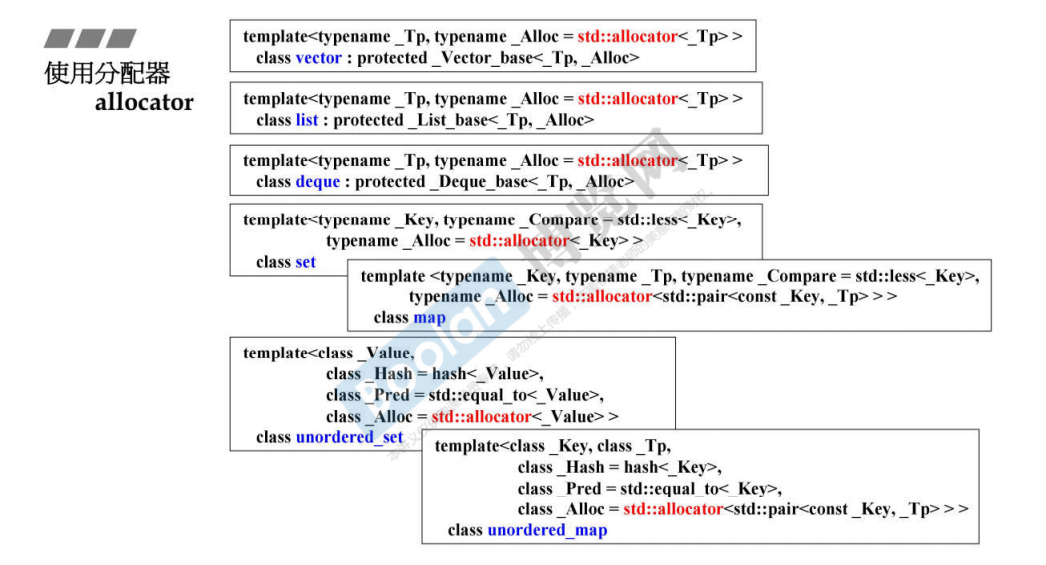
#include <list>
#include <stdexcept>
#include <string>
#include <cstdlib> //abort()
#include <cstdio> //snprintf()
#include <algorithm> //find()
#include <iostream>
#include <ctime>
#include <cstddef>
#include <memory> //內含 std::allocator
//欲使用 std::allocator 以外的 allocator, 得自行 #include <ext\...>
#ifdef __GNUC__
#include <ext\array_allocator.h>
#include <ext\mt_allocator.h>
#include <ext\debug_allocator.h>
#include <ext\pool_allocator.h>
#include <ext\bitmap_allocator.h>
#include <ext\malloc_allocator.h>
#include <ext\new_allocator.h>
#endif
namespace jj20
{
//pass A object to function template impl(),
//而 A 本身是個 class template, 帶有 type parameter T,
//那麼有無可能在 impl() 中抓出 T, 創建一個 list<T, A<T>> object?
//以下先暫時迴避上述疑問.
void test_list_with_special_allocator()
{
#ifdef __GNUC__
cout << "\ntest_list_with_special_allocator().......... \n";
//不能在 switch case 中宣告,只好下面這樣. //1000000次
list<string, allocator<string>> c1; //3140
list<string, __gnu_cxx::malloc_allocator<string>> c2; //3110
list<string, __gnu_cxx::new_allocator<string>> c3; //3156
list<string, __gnu_cxx::__pool_alloc<string>> c4; //4922
list<string, __gnu_cxx::__mt_alloc<string>> c5; //3297
list<string, __gnu_cxx::bitmap_allocator<string>> c6; //4781
int choice;
long value;
cout << "select: "
<< " (1) std::allocator "
<< " (2) malloc_allocator "
<< " (3) new_allocator "
<< " (4) __pool_alloc "
<< " (5) __mt_alloc "
<< " (6) bitmap_allocator ";
cin >> choice;
if ( choice != 0 ) {
cout << "how many elements: ";
cin >> value;
}
char buf[10];
clock_t timeStart = clock();
for(long i=0; i< value; ++i)
{
try {
snprintf(buf, 10, "%d", i);
switch (choice)
{
case 1 : c1.push_back(string(buf));
break;
case 2 : c2.push_back(string(buf));
break;
case 3 : c3.push_back(string(buf));
break;
case 4 : c4.push_back(string(buf));
break;
case 5 : c5.push_back(string(buf));
break;
case 6 : c6.push_back(string(buf));
break;
default:
break;
}
}
catch(exception& p) {
cout << "i=" << i << " " << p.what() << endl;
abort();
}
}
cout << "a lot of push_back(), milli-seconds : " << (clock()-timeStart) << endl;
//test all allocators' allocate() & deallocate();
int* p;
allocator<int> alloc1;
p = alloc1.allocate(1);
alloc1.deallocate(p,1);
__gnu_cxx::malloc_allocator<int> alloc2;
p = alloc2.allocate(1);
alloc2.deallocate(p,1);
__gnu_cxx::new_allocator<int> alloc3;
p = alloc3.allocate(1);
alloc3.deallocate(p,1);
__gnu_cxx::__pool_alloc<int> alloc4;
p = alloc4.allocate(2);
alloc4.deallocate(p,2); //我刻意令參數為 2, 但這有何意義!! 一次要 2 個 ints?
__gnu_cxx::__mt_alloc<int> alloc5;
p = alloc5.allocate(1);
alloc5.deallocate(p,1);
__gnu_cxx::bitmap_allocator<int> alloc6;
p = alloc6.allocate(3);
alloc6.deallocate(p,3); //我刻意令參數為 3, 但這有何意義!! 一次要 3 個 ints?
#endif
}
}
后记
这是STL标准库与泛型编程(侯捷)的第一份笔记,后续笔记会陆续更新。

